How to use ChatGPT for SEO purposes is a question that emerges more and more in the marketer’s world. Overall, ChatGPT isn’t a fully developed solution. But it does have intriguing potential – if you know how to use it correctly you can simplify your work.
The thing is that ChatGPT is not a magic wand. Sure, it can generate pages of text quickly, but this content will lack original perspectives and strategic optimization. If your goal is to produce high-quality content that performs well on Google, investing time and effort in human input and critical thinking is essential.
So let’s move on from the idea that ChatGPT can substitute human professionals and focus on the more exciting part: how it can improve outputs.
As AI rapidly revolutionizes nearly every aspect of our lives, this article will explore how to use ChatGPT for SEO.
Readers Also Enjoy: Types of Artificial Intelligence That Are Shaping the Future – DevriX
Before Starting With ChatGPT for SEO
Before starting, let’s briefly cover the basics.
What Is ChatGPT?
ChatGPT is basically a chatbot. More specifically a natural language processing chatbot from OpenAI. You can speak to it as if it were a human being about practically anything, SEO including.
It currently runs on two large language models (LLMs) called ChatGPT- 3.5 and ChatGPT-4 (ChatGPT-5 will be available soon). The first one is free. All you have to start communicating with ChatGPT is sign up, write a prompt (your message), press Enter and the bot will respond.
How ChatGPT works?
The reason why ChatGPT responds ‘like a human’ is called ‘next-token prediction.’ This technique operates by breaking down text into units or ‘tokens.’ Tokens are similar to how humans process text, recognizing it as groups of words and punctuation. When you provide your prompt, ChatGPT uses this mechanism to predict what should come next. That is why it can also predict tone of voice or writing style.
Best Uses of ChatGPT for SEO
ChatGPT is a generative AI designed to generate content. While you can certainly use it casually, relying on it entirely, like a schoolboy waiting for it to produce homework, is not a recommended approach for professionals. Over time, the quality of your content may deteriorate, and Google may penalize it.
Best uses of ChatGPT for SEO content writing include:
- Brainstorming titles
- Brainstorming keywords
- Outlining articles
- Writing captions and meta descriptions
- Generating Schema markup, and more
How to Use ChatGPT for SEO Content Writing
Finding the Right Content Topics
Everything starts with the idea. For instance, you are an IT company that wants to create some buzz around an online course on how to use generative AI in marketing.
While you can ask the bot to help out, you must do your own research first before heading to ChatGPT and asking it to write an SEO optimised article for your blog. You need to establish your target audience’s needs, preferences and pain points. Once that’s done, you could, for example, go to Google and see what other people are asking about online generative AI courses.
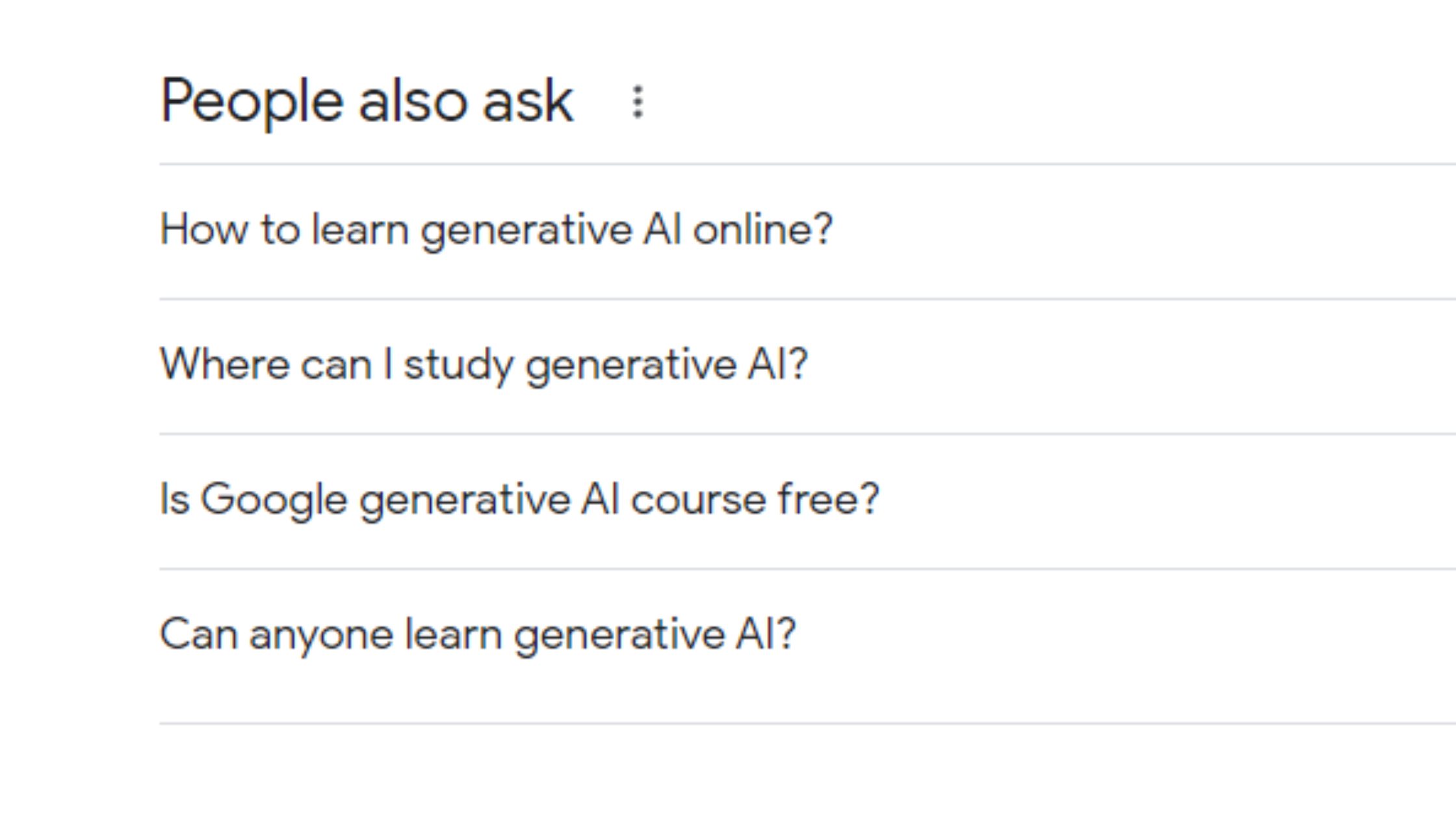
As you can see, it seems that users are mostly interested in the basics of an online generative AI course such as whether it’s free, how much it costs, more about the learning process, and how they can enroll.
Readers Also Enjoy: How to Use AI in Digital Marketing in 2023 – DevriX
Master SEO Prompts for ChatGPT
In communication with the bot, the most important thing is to master your SEO prompts. For instance, ChatGPT cannot detect sarcasm; it has a relatively simple level of understanding. The clearer your prompts are, the more valuable the answers will be.
So, continuing with the example, when you have the understanding that people are generally interested in an online course covering the basics of generative AI, you can be more specific with a prompt and ask for a list of titles to kick-off your SEO content writing using ChatGPT.
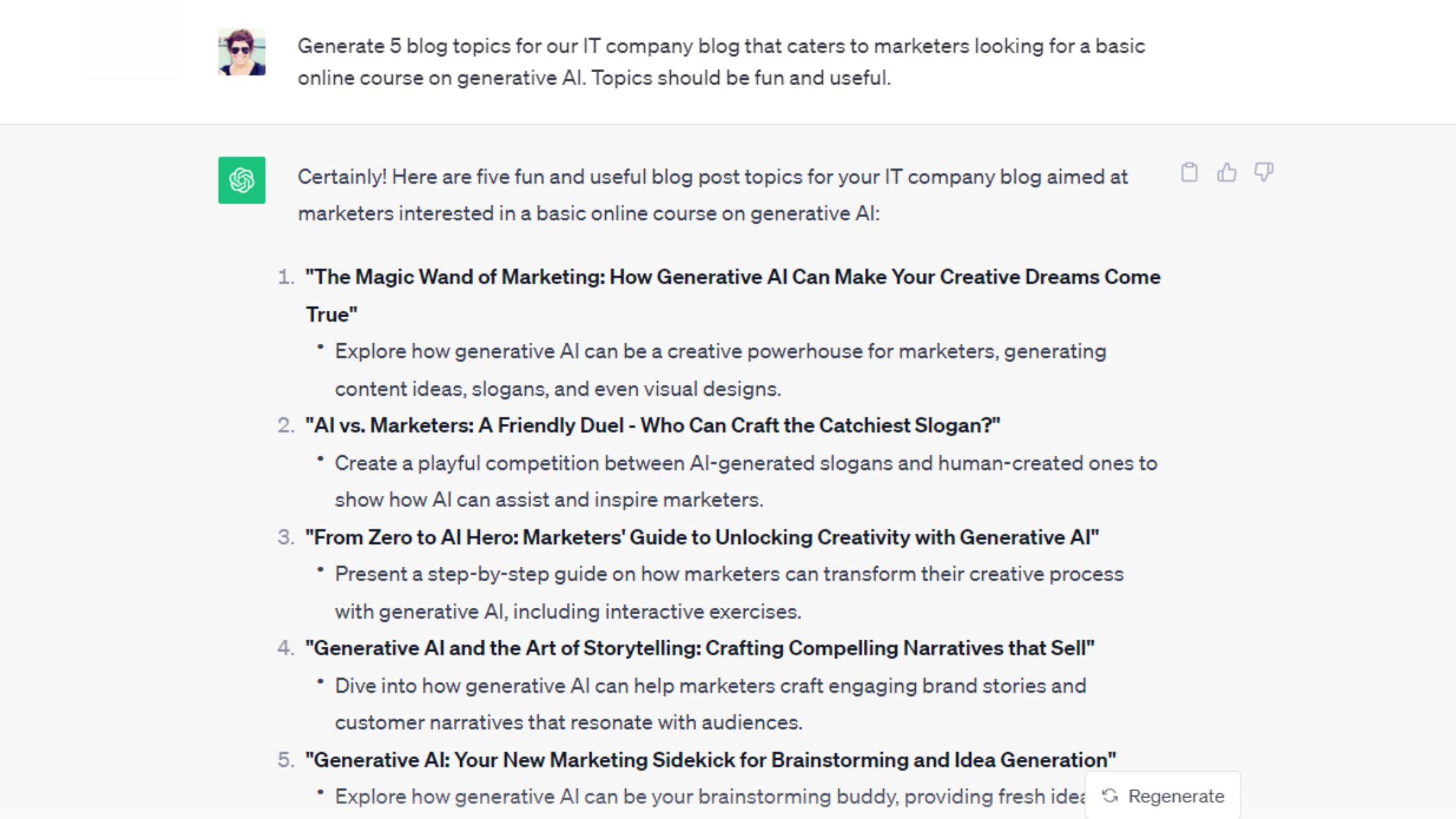
Is it enough? It might be. You already know people are interested in the basics of generative AI, and you have five fun-sounding blog topics that can attract your target audience. But, as you know, for SEO purposes and good ranking, you need more.
Keyword Research with ChatGPT
Using relevant, high-traffic keywords strategically throughout your content is essential for SEO success. Carefully selected keywords should be woven naturally into your blog post title, headers, body text, image alt text, meta descriptions, and conclusion. This is hard and time consuming work.
Can ChatGPT help you with your keyword research? To a certain extent, yes, but it is not the best tool for keyword research. The results can be useful primarily from a brainstorming perspective. You can ask it to generate anything from long-tail queries to Latent Semantic Indexing (LSI) keywords.
Let’s see what happens when we us ChatGPT for SEO and ask it to provide us with a list of long-tail keywords for an article about generative AI ad the art of storytelling:
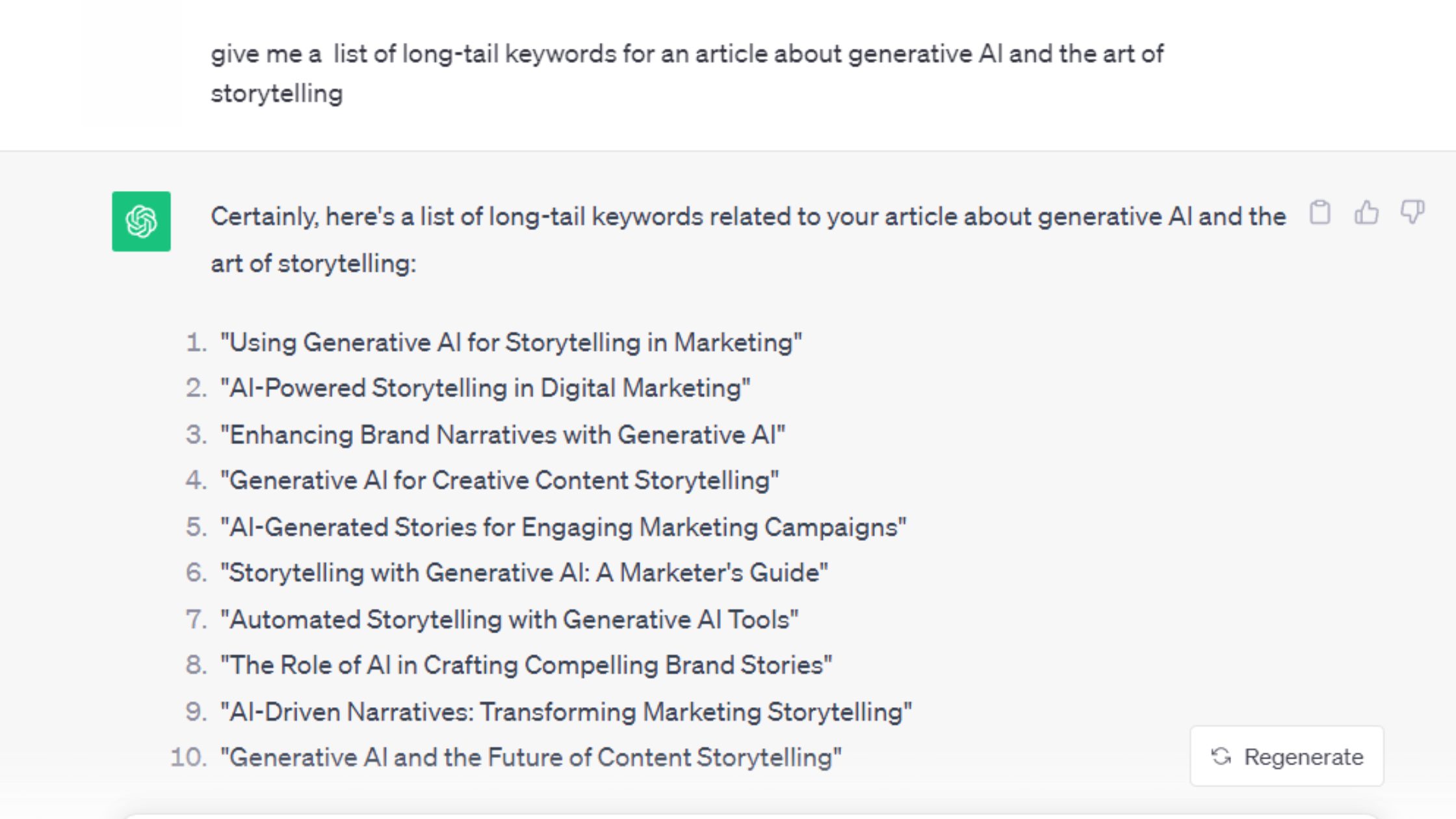
It seems that you now have long-tail keywords, but you don’t know if these are actually long-tail keywords that people search for. To determine this, you need to verify if there is search intent behind these long-tails and what their search volume is. Since ChatGPT is not a tool that can do that, you’ll have to use a professional keyword research tool like Semrush.
Here is the result of one of the suggested long-tail keywords: 0
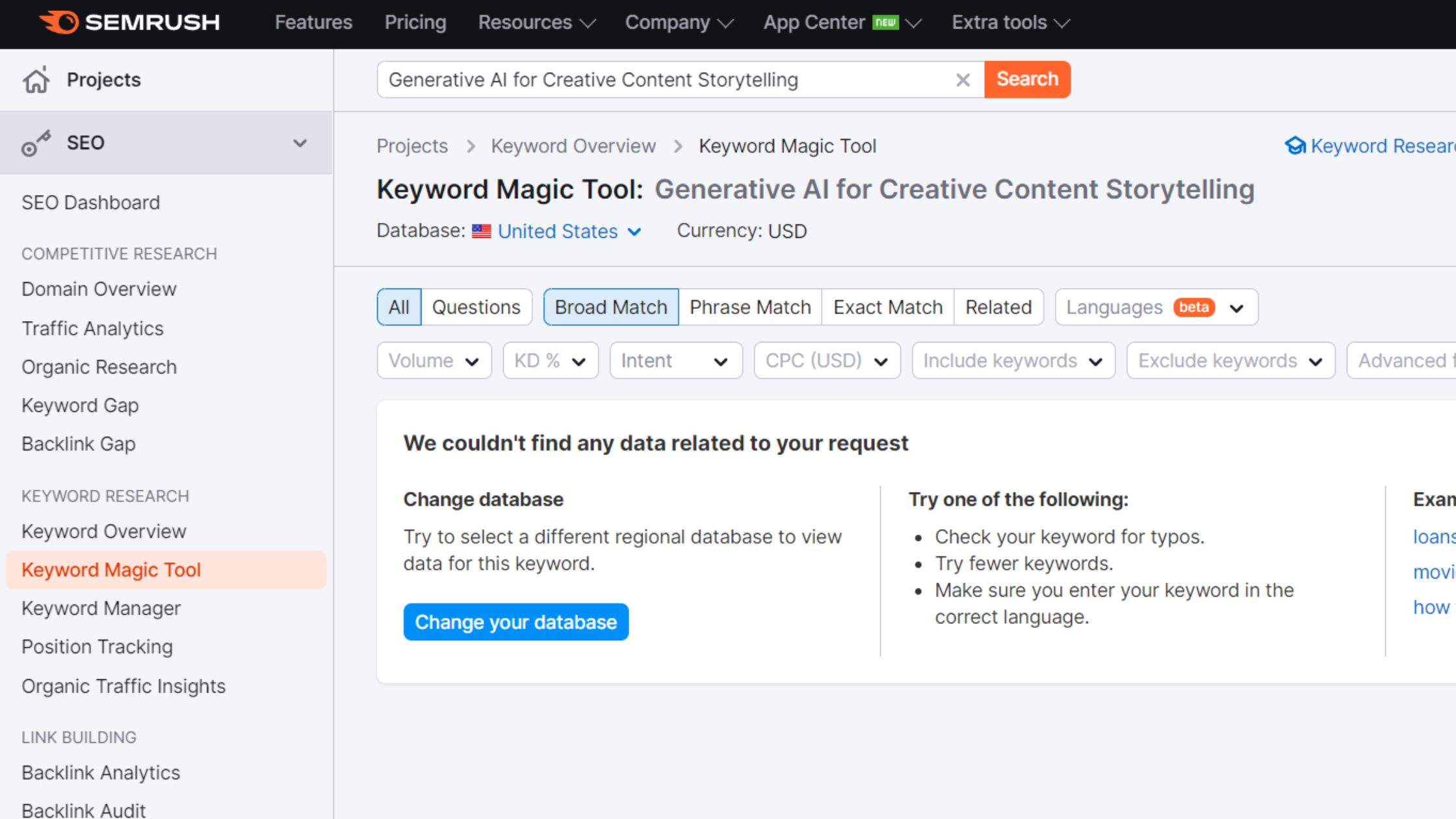
What should you do next? You can try using another prompt, focusing on shorter search terms, potentially having a decent monthly search volume.
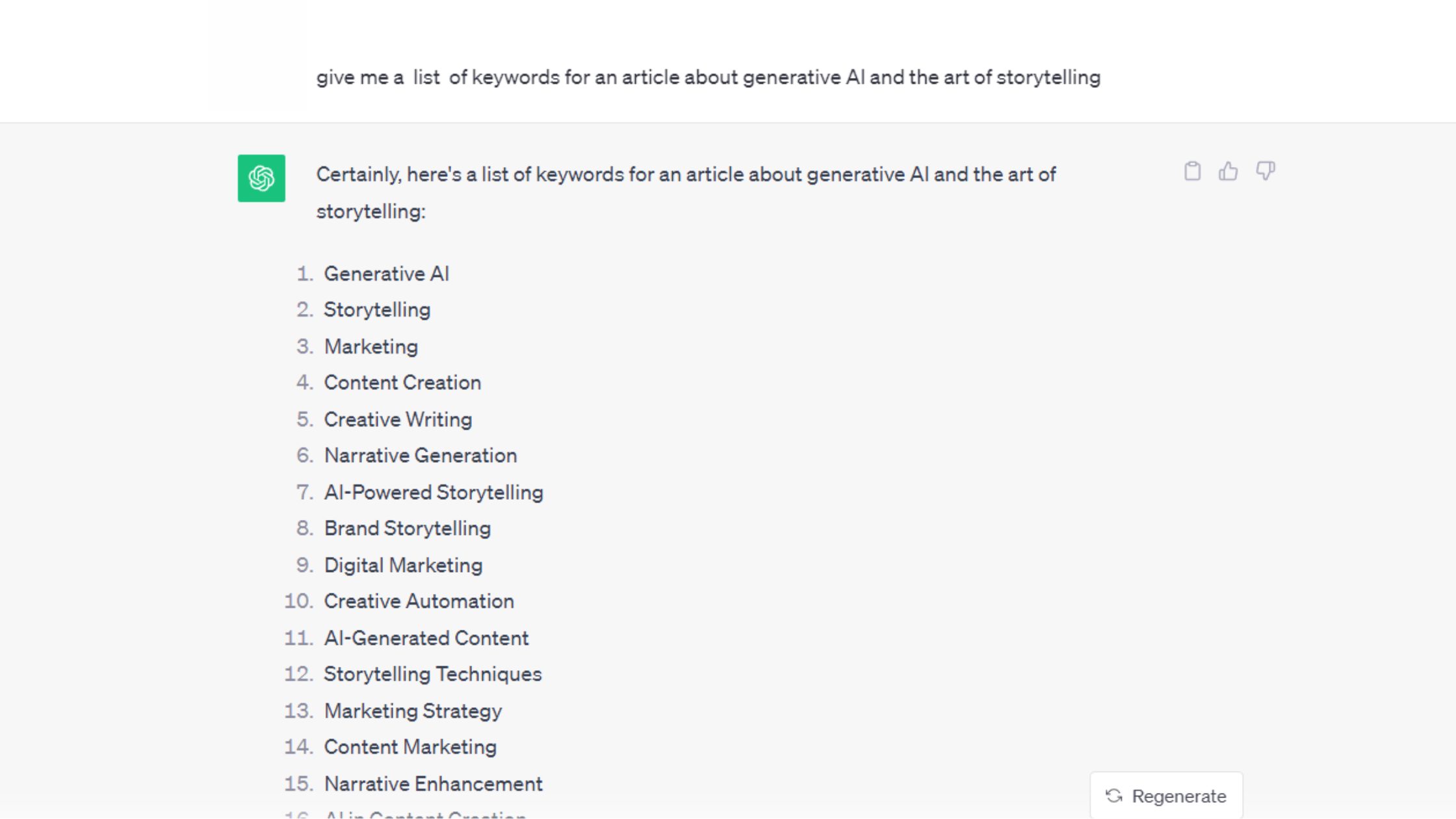
This looks somehow good, let’s check one of these on Semrush and see:
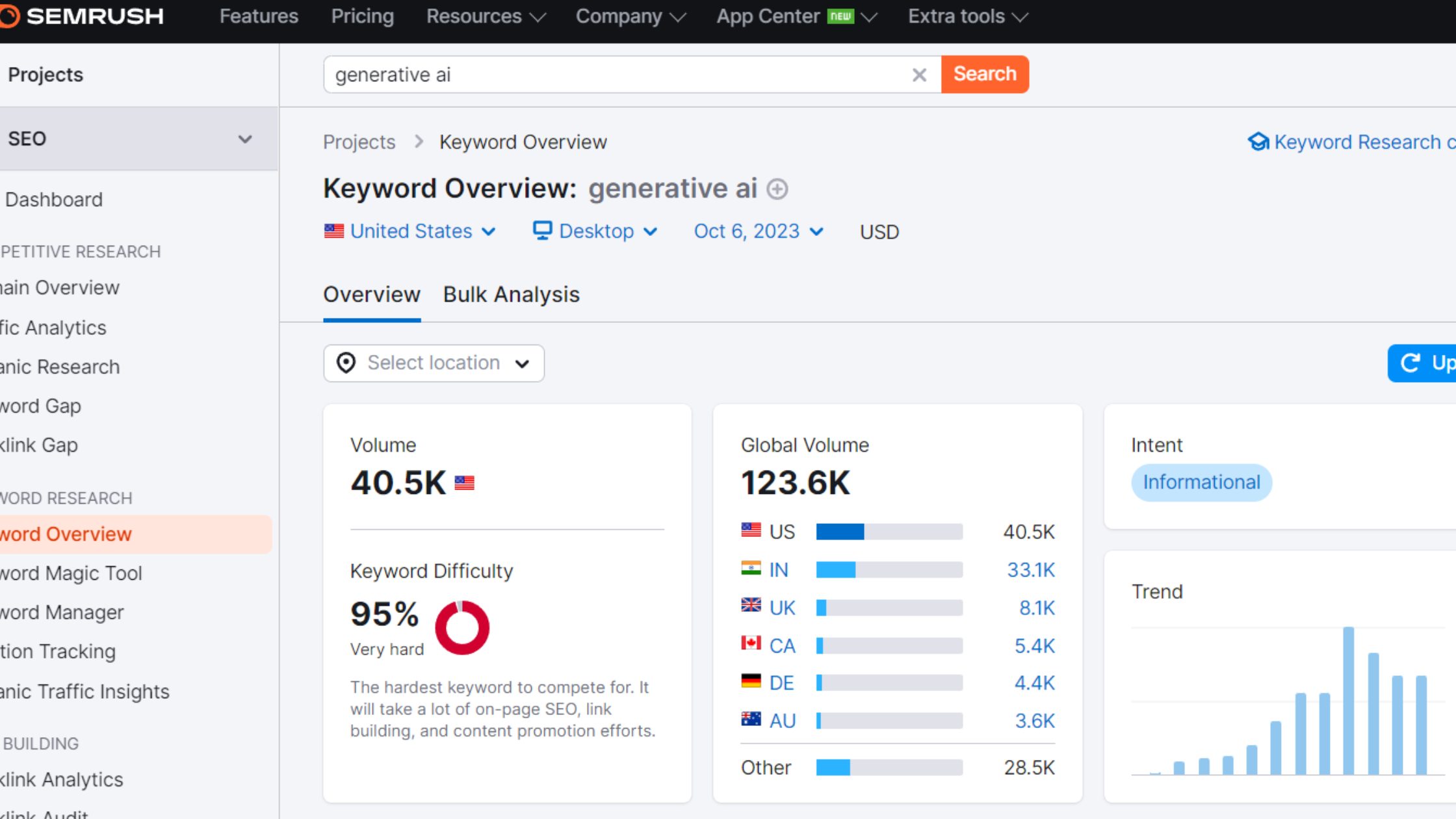
Here you are, caught between impossible-to-beat competition and zero user intent (even though tools like Semrush can register zero searches even in cases where there are thousands). Additionally, you have to keep in mind that even though OpenAI introduced ChatGPT in November 2023, the model has initially been trained on publicly available data until September 2021 and later has been updated to April 2023, while we’re 2024 already.
ChatGPT can help at the suggestion level, but you have to search and modify your queries to find the right keywords through other tools. After you identify them, you can still use ChatGPT to suggest related keywords to your target ones. You can also try semantically related keywords, or even go further by asking it to classify keywords by intent, and even create keyword clusters.
How to Use ChatGPT as a Creative Tool for SEO Purposes
Instead of relying on ChatGPT solely as a content generator, you can use it as a tool that helps you improve your writing and workflow while retaining full control over the optimization.
Outlines
ChatGPT is incredibly useful when creating outlines for an article. Once you have your title and keywords, you can ask it to create an article’s outline, incorporating those keywords into headings and subheadings. Then, pass everything through your critical thinking and ask for adjustments if needed.
Keyword Distribution
ChatGPT can create the first draft of your article and add your target keywords to the text. The output probably won’t be that satisfying but it will be the base from which to build on.
Grammar Check, Rephrase and Desired Tone
Work on every section of your article separately. Ask ChatGPT to check the grammar and punctuation in the paragraphs you want to write by yourself, and have it rephrase others that need improvements. If needed, it can always rewrite sections using a desired tone.
Remember that you should carefully review, fact-check, and edit any AI-generated content you produce.
ChatGPT for Content Promotion
Although promoting content is not the core focus of SEO, it can be a valuable complement to search engine optimization efforts. While SEO helps to establish organic authority and improve rankings, implementing effective content promotion strategies is essential for expanding the discovery of your content and achieving long-term success. The two work hand-in-hand to boost your content’s visibility and readership.
ChatGPT can streamline some of the more time-consuming and less technical aspects of SEO, such as writing social media captions or creating engaging social media posts, sprinkled with the relevant emojis and hashtags.
Readers Also Enjoy: The Right Approach to Generative AI and SEO in 2023 – DevriX
Wrap Up
While ChatGPT for SEO has its limitations, it can still be a useful aid for brainstorming, outlining, drafts, and promotions. In fact, with the right balance, it could even enhance, not replace, strategic high quality SEO content workflows.
![How to Use ChatGPT for SEO [2024 Guide]](https://devrix.com/wp-content/uploads/2023/11/How-to-Use-ChatGPT-for-SEO-2024-Guide-810x340.png)
![Small Business SEO Top 7 Benefits [2023]](https://devrix.com/wp-content/uploads/2021/12/Small-Business-SEO_-Top-7-Benefits-2023-380x160.png)


